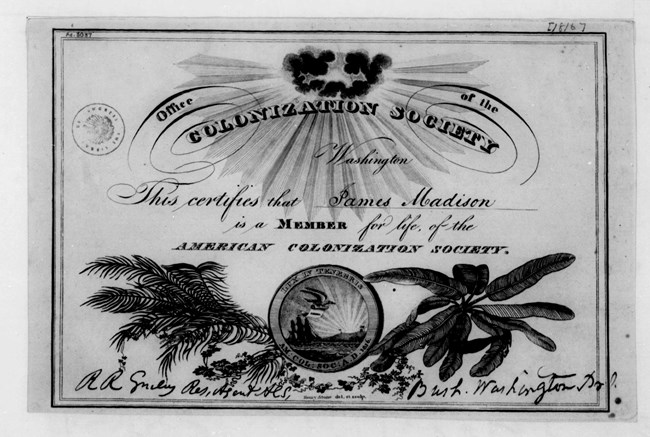
Library of Congress In November 1853, recently emancipated William and Rosabella Burke and their four children immigrated to Africa. The Burke family sailed on a ship called the Banshee, which left Baltimore with 261 immigrants.
The Burkes were among several thousand freed African Americans who chose to immigrate to Liberia during the antebellum period. Many of these immigrants struggled to establish new livelihoods in Liberia. Thousands died of disease within a few years. Inhabitants of the Windward Coast also viewed these newcomers with suspicion, calling them “black white men.”
Despite the limited interest among free African Americans, prominent white Americans supported colonization efforts as an alternative to emancipation in the United States. George Washington Parke Custis was among the members of the American Colonization Society (ACS) those who encouraged settlement in Africa because they feared the effects of integration among free Americans. Many abolitionists rejected colonization due to its anti-integration sentiment. William Burke wanted to go to Liberia. He was freed by George Washington Parke Custis and apprenticed himself to a blacksmith in Philadelphia before he immigrated to perfect his trade.
William Burke studied Latin and Greek at a newly established seminary in Monrovia, Liberia, where he became a Presbyterian minister in 1857. There, he educated his children and taught other members of his community. He also took several African children into his home.
Despite the hardships of being a colonist, William Burke was enthusiastic about his new life. After five years in Liberia he wrote: “Persons coming to Africa should expect to go through many hardships, such as are common to the first settlement in any new country. I expect it, and was not disappointed or discouraged at anything I met with; and so far from being dissatisfied with the country, I bless the Lord that ever my lot was cast in this part of the earth. The Lord has blessed me abundantly since my residence in Africa, for which I feel that I can never be sufficiently thankful.” (source: William Burke to Ralph Gurley, July 26, 1858. American Colonization Society Papers, Manuscript Division, Library of Congress.)
From Africa, the Burkes corresponded with Mary Custis Lee. The family's letters describing their lives in Liberia show they relied on the Lees to convey messages to and from relatives still enslaved in Virginia. Mrs. Burke shared details about her children’s lives and asked Mrs. Lee to “remember me kindly to Aunt Eleanor.” Repeating her husband's enthusiasm for their new life, Rosabella Burke wrote, “I love Africa and would not exchange it for America.” (Source: Rosabella Burke to Mary Custis Lee, February 20, 1859, The African Repository and Colonial Journal, vol. 35, no. 7, July 1859, p. 216, Library of Congress.)
In many respects, immigrants to Liberia re-created an American society. Colonists established small communities of people from the same geographic region in the United States. They spoke English and retained American manners, dress, and housing styles. Affluent citizens constructed two-story houses composed of stone basements and wood framed bodies with a portico on both the front and rear, a style copied from buildings in the southern American states from which most had emigrated
By 1867, a total of approximately 13,000 formerly enslaved people, freemen, and enslaved descendants had immigrated to Liberia from the United States. Descendants of the Burke family still live in Africa today. |
Last updated: August 19, 2025
